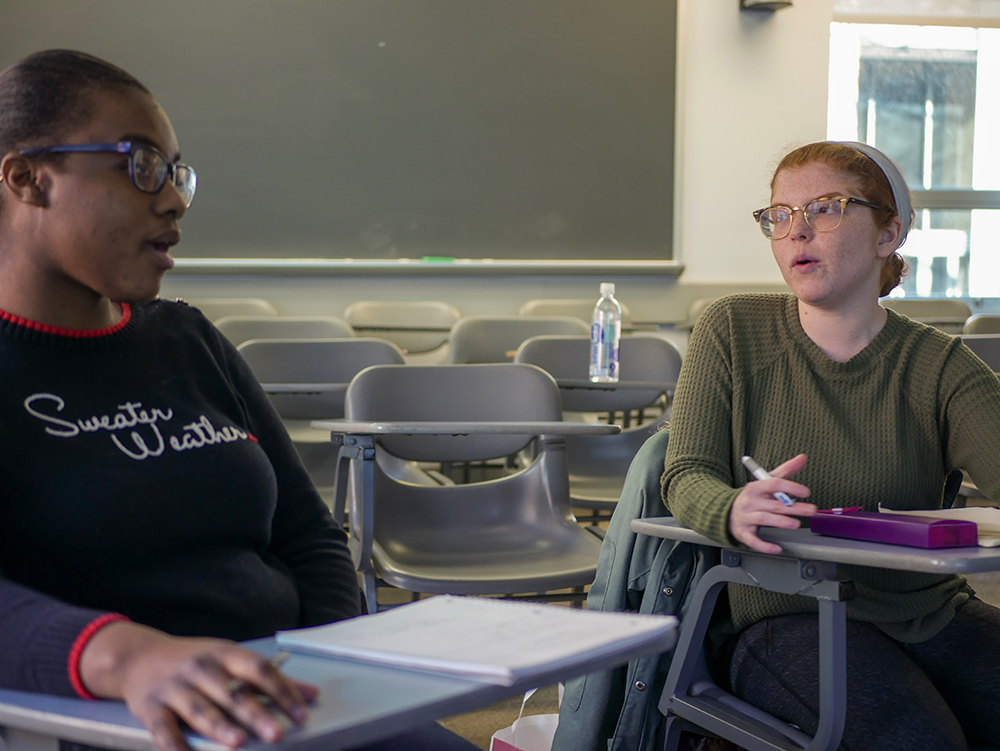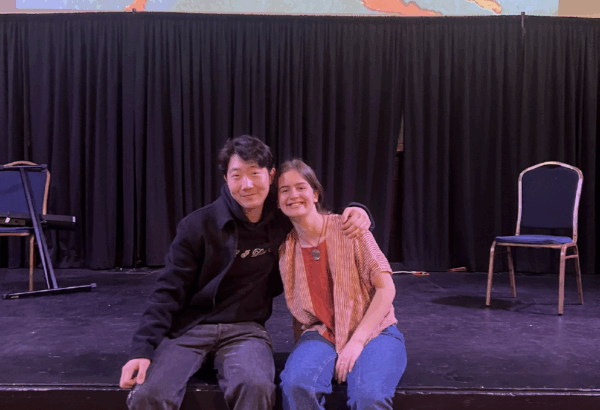Many fine sets of ground rules exist. These are the ones we at the PA Project for Civic Dialogue have developed over our years of leading Can We Talk? dialogues. Can We Talk? programming is part of the Gamba Family Red & Blue Exchange, an initiative of the SNF Paideia Program at the University of Pennsylvania.
Under each basic ground rule, you can read a discussion of its meaning and purpose.
Listen; it’s as important as talking.
Here’s how the poet Mark Nepo describes the goal of this ground rule: “To listen is to lean in softly, with a willingness to be changed by what you hear.”
Simply waiting for your turn to talk is not “listening.” Listening is work, a discipline and attitude which does not come naturally to us, flawed human beings that we all are. When we do the work of leaning in softly, as Nepo puts it, we stick with our listening even though the other person’s false starts, meanderings, or statements that cause emotion to rise in our throats. We stay willing, even eager, to hear something that will expand our thinking, maybe even shake it up a little. We offer the other people around the table the gift of listening to them precisely as we ourselves yearn to be heard.

Make room for everyone to speak. No one dominates.
Personalities differ. Not everyone is outgoing, eager to speak. It takes a conscious effort by the rest of the group to create spaces, openings where the introverted, the cautious, the outsider can slip into the stream of dialogue.
We’ve all been in that classroom or business meeting where there’s one guy who seems to think the whole point of the session is for everyone else to listen to him (and, yes, it’s usually a guy). So one way of summing up this ground rule is: “Don’t be that guy. And if you sense yourself becoming that guy, stop.”
Disagreement is fine. When it arises, don’t paper it over or try to ‘win’ it. Welcome it. And explore it—to understand it.
Civil dialogue does not—emphatically does not—require you to hold your tongue, to bury your true opinions for the sake of politeness or “keeping the peace.” We expect, we implore you to bring your full selves—your experiences, your opinions, your passion—to the dialogue. But this ground rule advises that, while you should not hide your views, neither should you brandish them as weapons in a futile bid to “win” an argument.
Our society is painfully addicted to the notion of “debates” that someone wins, and someone loses. Here, we ask you to redefine the “win.” If you leave a dialogue with a better understanding of why someone else (who might even strike you as otherwise a pretty nice person) holds a view that’s quite different from yours, then that’s the win we seek. If they leave the table with a similar understanding about you, then it’s a double win.
And if those things occur, you might also find you’ve won in a different way: You have gained a better understanding of your own views and the most persuasive ways to express them.
Be open to the possibility that your information is incomplete.
Sadly, it’s becoming ever truer that we Americans live inside distinct information silos, shaped by race, class and partisan allegiances. A decade or more ago, it was much more likely that everyone in a dialogue could agree upon a few basic facts underlying an issue, even if they put different weights on various facts and reasoned their way to different conclusions. Now, as Americans often hunker down in vastly different information silos, the chances of “fact wars” breaking out and impairing dialogue have grown greater. We admit to having no surefire cure for such fact wars. We offer this ground rule as a reminder of the intrinsic value of intellectual humility. While it is surely possible that another person may be erroneously citing as fact something you know to be false, due to the silo they inhabit, this rule urges you to recognize that in a moment that same person might cite a pertinent fact that you were unaware of because of the silo you inhabit.
Try to build on each other’s ideas.
You’ve probably had this experience in conversation or meetings. You offer up something you consider important, insightful or useful, then someone else jumps in with no acknowledgment of your point and redirects the conversation. It feels lousy when that happens, doesn’t it? So don’t do that to others. Work to connect what you have to say what others have said before. And if you can’t do that and do want to launch a new direction, have the courtesy to acknowledge that and ask the group’s permission.
Ask clarifying questions—not to rebut or dismiss, but to understand.
When speaking, it’s the rare person who begins with a perfect topic sentence, followed by a crystal clear elaboration of the point. The more nuanced or emotional the topic, the harder time many people have conveying everything they want to say. Before stating disagreement or rejection of something someone has said, first try to make sure you’ve really heard and understood them. Good clarifying questions begin with phrases like “Help me understand …,” “If I’m hearing you right …,” “I wonder if you could unpack that a little bit more for me …”” or “Would it be OK if I press you a little bit on one point in what you said …?” Beyond that, good clarifying questions are not attacks or rebuttals wearing passive-aggressive clothes e.g. “I’m wondering how anyone could have voted for such an ignorant racist?”
Be honest, but never cruel.
Again, civil dialogue does not require you to bury your views or your passions for the sake of politeness. But it does ask you to avoid personal attacks or insults that leave wounds and shut down conversations. Find ways to express your passionate views that open t doors to further dialogue and show respect for others’ humanity and their shared stake in the future of our society and our world.
Last rule same as the first: Listen. (A tip: Before speaking, take a pause.)
Remember, listening is a skill you work at. One part of that work is always remembering to pause before you speak. This is especially true when others’ words rouse sharp emotions inside you. That rush of emotion has a biological basis. Pause a beat or two, perhaps remind yourself “ground rules, ground rules,” let that surge of hormones subside, then respond in a considered and considerate way.




